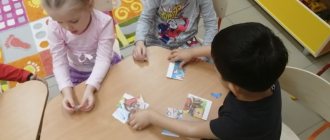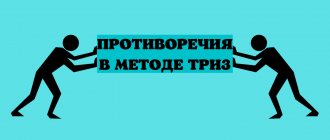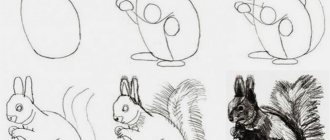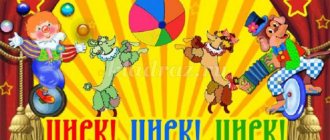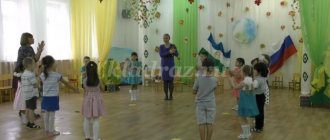Lesson summary for the senior group “Magic Chest” based on fairy tales
Summary of the lesson in the senior group
“Magic Chest”
Objectives: Educational direction. 1) Give children an idea of the peculiarities of ancient Russian life; 2) Teach word formation skills, 3) Practice the use of grammatical categories. Correctional direction. 1) Develop intellectual functions - memory, attention;
2) Form speech-auditory perception and speech-motor skills; 3) Improve fine motor skills of the fingers. Educational direction. 1) Cultivate love and respect for folk traditions, the origins of Russian culture. Preliminary work: 1) Conversations and reading about the Russian people; 2) Introducing children with Russian folk tales, chants, sayings, proverbs, nursery rhymes, counting rhymes, tongue twisters; 3) Listening to audio recordings of Russian folk tales, songs, nursery rhymes; 4) Dramatization based on Russian fairy tales; 5) Learning fairy tales, folk games, etc. ….6) Acquaintance with Russian costume and household utensils. Material, equipment: Decoration: Russian stove, table, benches, chest, homespun rugs, towels embroidered in Russian style, tablecloth; tableware: samovar, wooden and earthenware; Russian folk costumes, multi-colored ribbons for the game “Zarya - Zaryanitsa”, musical instruments: balalaika, rattle, wooden spoons, bells. PROGRESS OF THE LESSON. Maryushka: Hello, good fellows and beautiful maidens! My name is Maryushka. You are welcome to visit my hut. Come in, see how I live. (The children pass by, looking at the hut). You have come to the upper room. - the most elegant and beautiful room in my house, guests were received in it. Children, what do you see here? Children: (stove, table, benches, chest).
Maryushka: Tell me, what item takes up the most space in my room? Children: stove. Martyushka: YES, stove. In the old Russian hut there was only one room, and almost half of it was occupied by a Russian stove. Oh, you little stove. Help us, boyarushka: You cook, bake, Heat, light, bring wealth to the house. The stove was the most important thing in the house6 In it and they cooked food, and she heated the house. You could even sleep on the stove. Guys, let's come here. Who will tell me what this is? Children come up to the table: This is a table, and there is a tablecloth on the table. Maryushka: And what is next to the table? Children: there are benches next to the table. Maryushka: And what is on the table? Children: dishes. Maryushka: What kind of dishes? Children: (children’s answers). Maryushka: Guys, look at how beautiful the mugs and spoons are, painted. Who can tell me what kind of painting the craftsmen painted my dishes with? Children: (children’s answers)
Maryushka: How did you guess? What elements of the Khokhloma pattern do you know? Children: (presumable answer). Maryushka: Guys, tell me, what were dishes made of before? Children: (children's answers) Maryushka: what kind of modern dishes are now? Children: (presumable answer). Maryushka: sitting earlier on what? Children: (children's answer). Maryushka: guys, there is one more wonderful thing in my room. What is this? Children: This is a chest. Maryushka: Guess, dear guests, what is stored there? Children: (children give tentative answers). Maryushka: Yes, what should we think and guess, let me open it and see! (we try to open it, but nothing works).Oh, I think I guessed it! This chest is not simple, it opens when you remember proverbs and sayings about the hut, about work. (“The hut is not red in its corners, it is red in its pies.” “Without labor you cannot catch a fish from the pond.” “Labor feeds, but laziness spoils” "The master's work is afraid." etc.) The chest opens, and from there they take out a Russian folk costume. Maryushka: Guys, look at this? Children: (children's answer). Maryushka: That's right, before such dresses and T-shirts as you weren’t there, and the women and girls sewed their own clothes. Name the details of this outfit.
Children: (children's answer). Maryushka: Russian women wore such outfits. So what is this outfit? Children: female. Maryushka: And here’s another outfit, who do you think wore it? Children: men, guys. Maryushka: This outfit, what? Children: Male. Maryushka: Name the details of men’s clothing. Children: (probable answers). Maryushka: Why was the shirt called a kosovorotka? Children: (children's answer). Maryushka: The children worked in such clothes, and went to festivities, sang and danced, and led round dances. And in order to sew such an outfit, the girls had to do needlework in the evenings, but the trouble is - there was no electricity and people came up with something, who can tell me? Children: answer. Maryushka: What did they make the splinter from? Children: (children's answer) Maryushka: Let's do it too. Now let’s try to light a torch so that it illuminates our room. And we'll play a game. I will tell you the words as they were spoken in the old days, and you will name them as they say them now. Eyes - eyes Hut - house - towel - towel - light bulb
Cradle-bed Sash-belt Cast iron-saucepan Cartridge-cap Maryushka: Well done, who wants to see what else is in my chest? Name a proverb or saying. Children: (name a proverb or saying). Maryushka: Guys, look, these are my ribbons. And what are they? Children: (multi-colored). Maryushka: Now we will play my favorite game “Zarya-Zaryanitsa”. The game is being played Zarya – Zaryanitsa, the red maiden. She was walking across the field and dropped her keys. Golden keys, blue ribbons, curled rings, she walked across the field.” Maryushka: Guys, you are so funny, mischievous, you killed me. Now you and I will sit on a bench next to each other and talk well. I’ll tell you that in the old days the Russian people loved not only songs and dances, jokes and fairy tales, but they also loved to talk to each other so that they would not make mistakes in words with tongue twisters. Do you know tongue twisters? Children: (tell tongue twisters). Maryushka: There’s probably something else in my chest, who will help me unlock it? Children: (proverbs or sayings). Maryushka: Guys, what is this?
Children: (musical instruments). Maryushka: Name them? Children: (spoons, accordion, rattles, pipes, bells). Maryushka: Would you like to play them, become musicians? Like our neighbor. The conversation was fun. Geese on the harp, ducks to pipes, tap dancers to rattles. Seagulls in balalaikas. Two baby tits Played spoons. The children performed a Russian folk song. Maryushka: Well done, kids, you are also wonderful musicians! Well, let’s go to the chest and open it. Who will help me? Children: (proverb or saying). Maryushka: Guys, this is my bundle. It contains scraps, I used them to make dolls for myself, my mother taught me. And here is my doll Dunyasha, do you like her? I can teach you how to make such toys. Want to? Then sit down as comfortably as possible and help each other. The children, according to Maryushka’s explanation, make dolls. Maryushka: Guys, I’m very glad that you came to visit me in my room today. The pies have arrived, enjoy yourselves to your health!
